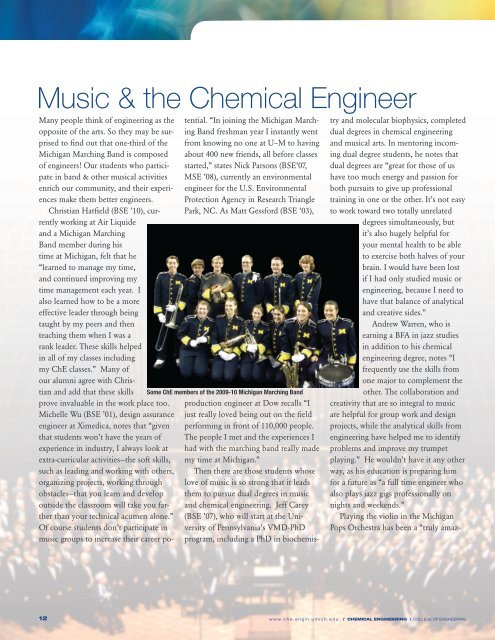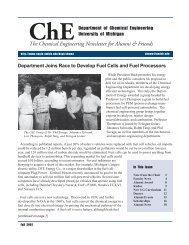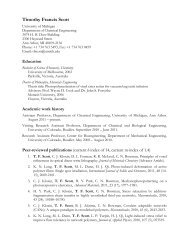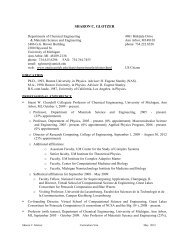Making Oil at Warp Speed - Chemical Engineering - University of ...
Making Oil at Warp Speed - Chemical Engineering - University of ...
Making Oil at Warp Speed - Chemical Engineering - University of ...
Create successful ePaper yourself
Turn your PDF publications into a flip-book with our unique Google optimized e-Paper software.
Music & the <strong>Chemical</strong> Engineer<br />
Many people think <strong>of</strong> engineering as the<br />
opposite <strong>of</strong> the arts. So they may be surprised<br />
to find out th<strong>at</strong> one-third <strong>of</strong> the<br />
Michigan Marching Band is composed<br />
<strong>of</strong> engineers! Our students who particip<strong>at</strong>e<br />
in band & other musical activities<br />
enrich our community, and their experiences<br />
make them better engineers.<br />
Christian H<strong>at</strong>field (BSE ’10), currently<br />
working <strong>at</strong> Air Liquide<br />
and a Michigan Marching<br />
Band member during his<br />
time <strong>at</strong> Michigan, felt th<strong>at</strong> he<br />
“learned to manage my time,<br />
and continued improving my<br />
time management each year. I<br />
also learned how to be a more<br />
effective leader through being<br />
taught by my peers and then<br />
teaching them when I was a<br />
rank leader. These skills helped<br />
in all <strong>of</strong> my classes including<br />
my ChE classes.” Many <strong>of</strong><br />
our alumni agree with Christian<br />
and add th<strong>at</strong> these skills<br />
prove invaluable in the work place too.<br />
Michelle Wu (BSE ’01), design assurance<br />
engineer <strong>at</strong> Ximedica, notes th<strong>at</strong> “given<br />
th<strong>at</strong> students won’t have the years <strong>of</strong><br />
experience in industry, I always look <strong>at</strong><br />
extra-curricular activities—the s<strong>of</strong>t skills,<br />
such as leading and working with others,<br />
organizing projects, working through<br />
obstacles—th<strong>at</strong> you learn and develop<br />
outside the classroom will take you farther<br />
than your technical acumen alone.”<br />
Of course students don’t particip<strong>at</strong>e in<br />
music groups to increase their career po-<br />
tential. “In joining the Michigan Marching<br />
Band freshman year I instantly went<br />
from knowing no one <strong>at</strong> U–M to having<br />
about 400 new friends, all before classes<br />
started,” st<strong>at</strong>es Nick Parsons (BSE’07,<br />
MSE ’08), currently an environmental<br />
engineer for the U.S. Environmental<br />
Protection Agency in Research Triangle<br />
Park, NC. As M<strong>at</strong>t Gessford (BSE ’03),<br />
Some ChE members <strong>of</strong> the 2009-10 Michigan Marching Band<br />
production engineer <strong>at</strong> Dow recalls “I<br />
just really loved being out on the field<br />
performing in front <strong>of</strong> 110,000 people.<br />
The people I met and the experiences I<br />
had with the marching band really made<br />
my time <strong>at</strong> Michigan.”<br />
Then there are those students whose<br />
love <strong>of</strong> music is so strong th<strong>at</strong> it leads<br />
them to pursue dual degrees in music<br />
and chemical engineering. Jeff Carey<br />
(BSE ’07), who will start <strong>at</strong> the <strong>University</strong><br />
<strong>of</strong> Pennsylvania’s VMD-PhD<br />
program, including a PhD in biochemis-<br />
try and molecular biophysics, completed<br />
dual degrees in chemical engineering<br />
and musical arts. In mentoring incoming<br />
dual degree students, he notes th<strong>at</strong><br />
dual degrees are “gre<strong>at</strong> for those <strong>of</strong> us<br />
have too much energy and passion for<br />
both pursuits to give up pr<strong>of</strong>essional<br />
training in one or the other. It’s not easy<br />
to work toward two totally unrel<strong>at</strong>ed<br />
degrees simultaneously, but<br />
it’s also hugely helpful for<br />
your mental health to be able<br />
to exercise both halves <strong>of</strong> your<br />
brain. I would have been lost<br />
if I had only studied music or<br />
engineering, because I need to<br />
have th<strong>at</strong> balance <strong>of</strong> analytical<br />
and cre<strong>at</strong>ive sides.”<br />
Andrew Warren, who is<br />
earning a BFA in jazz studies<br />
in addition to his chemical<br />
engineering degree, notes “I<br />
frequently use the skills from<br />
one major to complement the<br />
other. The collabor<strong>at</strong>ion and<br />
cre<strong>at</strong>ivity th<strong>at</strong> are so integral to music<br />
are helpful for group work and design<br />
projects, while the analytical skills from<br />
engineering have helped me to identify<br />
problems and improve my trumpet<br />
playing.” He wouldn’t have it any other<br />
way, as his educ<strong>at</strong>ion is preparing him<br />
for a future as “a full time engineer who<br />
also plays jazz gigs pr<strong>of</strong>essionally on<br />
nights and weekends.”<br />
Playing the violin in the Michigan<br />
Pops Orchestra has been a “truly amaz-<br />
12 w w w . c h e . e n g i n . u m i c h . e d u / CHEMICAL ENGINEERING / COLLEGE OF ENGINEERING





